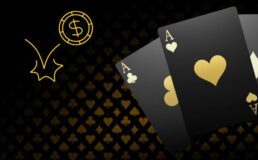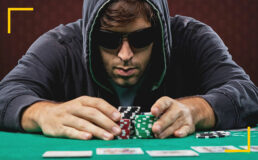 In the world of poker, where strategy, skill, and psychology converge, there’s a term that strikes fear into the hearts of both novices and seasoned players alike: angle shooting.
In the world of poker, where strategy, skill, and psychology converge, there’s a term that strikes fear into the hearts of both novices and seasoned players alike: angle shooting.
Angle shooting is a controversial practice that blurs the line between sharp strategy and unethical behaviour.
In this comprehensive guide, we will delve into every aspect of angle shooting in poker, from understanding what it entails to strategies for avoiding it.
Whether you’re a casual player or a dedicated pro, arming yourself with knowledge about angle shooting is crucial for maintaining a fair and enjoyable poker experience.
WHAT IS AN ANGLE SHOOT IN POKER?
A poker angle shoot refers to a deliberate and often deceptive attempt by a player to manipulate the game to their advantage, usually by exploiting gaps in the rules or taking advantage of opponents’ inattentiveness.
The angle shoot falls into a grey area of poker ethics, as it’s not outright cheating but involves bending the rules to gain an unfair advantage.
It is used for many reasons, but mostly to get under the opponent’s skin and try to illicit specific reactions.
An angle shoot could also aim to unveil the opponent’s hand depending on the behaviour shown by the opponent in question.
HOW TO AVOID ANGLE SHOOTING IN POKER
Avoiding poker angle shooting requires a combination of vigilance, understanding the rules, and maintaining a spirit of fair play.
Here are some strategies to consider:
- Know the Rules: Familiarise yourself with the house rules. The more you know, the less likely you are to fall victim to poker angle shoots. Although it isn’t illegal to disregard poker’s unwritten rules, it will give you a bad reputation.
- Stay Alert: Pay attention to the actions of your opponents. If something seems off or contradictory, don’t hesitate to clarify with the dealer or a floor manager.
- Maintain Sportsmanship: Always play with integrity. Treat your opponents with respect and expect the same from them. Avoid using tactics that could be interpreted as angle shoots. The antithesis of this concept happened in a big game between Phil Hellmuth and Tony G, which is worth checking out to see how poker angle shoots work in a card room.
WHAT TO DO IF YOU ARE A VICTIM OF ANGLE SHOOTING?
If you find yourself on the receiving end of an angle shoot, follow these steps:
- Stay Calm: It’s easy to get frustrated, but maintaining your composure is crucial. Responding emotionally might escalate the situation.
- Seek Clarification: Politely ask the dealer or a floor manager for clarification on the rules if you’re uncertain about an opponent’s action.
- Raise Concerns: If you believe you’ve been a victim of angle shoots, express your concerns to the dealer or floor manager. They are there to ensure a fair game.
THE MOST COMMON MISTAKES MADE BY ANGLE SHOOTERS
 Angle shooters often exploit the fine line between legality and unsportsmanlike behaviour.
Angle shooters often exploit the fine line between legality and unsportsmanlike behaviour.
Some of the most common mistakes they make include:
- Misrepresentation: Providing incomplete or misleading information about their hand or the game’s rules to induce opponents into making poor decisions.
- String Betting: Placing chips into the pot in multiple motions, which can confuse opponents into making decisions based on incomplete information.
- Hidden Chips: Intentionally hiding big denomination chips (high-value chips) behind smaller ones to make opponents believe they are betting less than they are.
- Acting Out of Turn: Pretending it’s their turn to act to gauge opponents’ reactions before making their decision.
EXAMPLES OF ANGLE SHOOT ON THE POKER TABLE
If you ever need an example of what to avoid doing in a poker room, check out the list below.
- The Chip Splash: A player makes a massive, messy bet that’s hard for opponents to count, making it challenging to respond accurately.
- The Slow Roll: Deliberately taking an excessive amount of time to reveal a strong winning hand, creating false hope for adversaries.
- The Fake All-In: Pushing chips forward, giving the appearance of going all-in, but actually leaving some chips behind on the betting line. Making the forward motion with a big stack size hints that the player is going all-in
- Ambiguous check: Checking without making the double-tap movement is poor etiquette, but it can definitely be a genuine mistake. To be safe, a verbal declaration of checking can be done.
- Fake folding: Another perfectly acceptable but unethical angle shot is appearing disinterested in a hand and raising chips at the last minute. Inexperienced opponents might think that the angle shooter has a weak hand or is about to fold, potentially altering their reading of the player in future hands.
- Pump fake: This is a deliberate and deceptive action that a player takes to mislead their adversaries about the strength of their hand. Like a pump fake in sports, where a player pretends to perform an action to confuse their opponent, a pump fake in poker involves actions that may misrepresent a player’s intentions, prompting adversaries to react in a certain way.
For example, a player might execute a pump fake by hesitating before making a large bet, leading their adversaries to believe they have a strong hand. This could cause adversaries with weaker hands to fold or make larger player bets than they originally intended. The goal of a pump fake is to manipulate adversaries into making suboptimal decisions based on false information, ultimately benefiting the player executing the pump fake. - String bet: This is quite a big deal in poker rooms. String betting is an illegal betting action where a player attempts to incrementally add chips (more money) to the big pot by making multiple motions rather than placing all the chips in one motion. String betting is prohibited because it can give the player an unfair edge by allowing them to gauge reactions and gain information from adversaries before committing to the full bet.
For example, if a player wants to bet 100 chips, a string bet would occur if they placed 50 chips in the pot and then went back to their stack to add more chips to complete the bet. This is not allowed because it gives the player an opportunity to see how their initial bet influenced their adversaries” reactions before committing the rest of their chips. - False raise: An incorrect or insufficient increase in the previous bet made during a betting round. It occurs when a player announces a raise but doesn’t put out the required amount of chips to meet the minimum or full raise.
False raising can lead to confusion at the table and disrupt the flow of the round. In most poker games, a player’s verbal confirmation of a raise is typically binding, meaning they are committed to putting out the correct amount of chips according to the rules. If a player fails to put out the correct amount after announcing a raise, they would usually be required to correct their action by either putting out the correct amount or retracting their verbal raise declaration and just calling the original bet.
ANGLE SHOOTING AT ONLINE CASINO
While poker angle shooting is more prevalent in live cash games, it can also occur in online poker.
Examples include:
- Disconnect Exploitation: Abusing intentional disconnections to gain extra time to make decisions.
- Collusion: Poker players communicating off-platform to gain an unfair advantage. This, however, is punishable by a fine or a ban since it always goes against the house rules.
- Misleading Chat: Using chat messages to deceive opponents about intentions or hand strength. This is quite a common tactic to either throw adversaries off or gauge your opponent’s reaction to the message and act accordingly.
ANGLE SHOOT ONLINE POKER
Online poker presents its own set of challenges when it comes to angle shooting.
Due to the virtual nature of the game, some tactics include:
- Fake Timing: Deliberately taking the maximum time allowed for a decision to induce impatience in opponents.
- Multiple Account Exploitation: A player using multiple accounts to gain an unfair edge in a single game.
- Bots and Scripts: Automated software that can mimic human decisions and actions, giving a massive advantage to the user.
ANGLE SHOOT IN LIVE POKER
In live poker, where interactions are face-to-face, angle shooting can be particularly distressing.
Some examples of a live angle shoot may include:
- Miscounting Chips: Deliberately providing incorrect chip counts to confuse other players.
- Verbal Misrepresentation: Making ambiguous or misleading statements about hand strength to influence other players’ decisions.
- Intentional Splashing: Throwing chips into the pot without stacking them properly, making it difficult for other players to assess the bet accurately.
WHAT IS NOT ANGLE SHOOTING IN POKER?
To clarify the boundaries, here are actions that are not considered poker angling:
- Bluffing: Strategically misrepresenting your hand strength to induce others to fold. Bluffing is a fundamental aspect of poker.
- Mind Games: Using psychological tactics to manipulate other players’ decisions within the bounds of the rules. Any verbal action is fair game as long as no offensive language is used.
- Taking Your Time: It’s acceptable to take a reasonable amount of time to make decisions, especially in complex situations. However, excessive deliberate stalling is generally frowned upon.
CONCLUSION – AVOID BEING AN ANGLE SHOOTER
In the realm of poker etiquette, angling is a taboo that players avoid like a bad beat. It’s a practice that not only disrupts the harmony of poker but also tarnishes the reputation of the angle shooter.
The poker community is tightly knit, and word spreads faster than a royal flush.
Players who engage in angling risk being labelled as untrustworthy and unsportsmanlike, damaging their relationships and credibility within the poker circle.
When you sit down at a table of poker, whether it’s a lively home game or a high-stakes casino tournament, remember that poker is more than just a battle of cards—it’s a test of character.
Awareness of the line between strategic play and unethical behaviour is vital for upholding the integrity of the game.
By following these principles, you protect yourself from potential angle shooters and contribute to a positive atmosphere where skill, sportsmanship, and camaraderie flourish.
FAQ
✅ Is angle shooting the biggest mistake at the poker table?
Poker angle shooting is considered one of the most serious breaches of unwritten etiquette, as it undermines the integrity of the game.
However, other mistakes, such as poor strategy or misreading other players, can also significantly impact your performance.
✅ Is angle shooting a form of cheating in poker?
While angle shooting doesn’t always involve explicit rule-breaking, it straddles the line between sharp tactics and unethical behaviour.
Some players consider it a form of cheating due to its deceptive nature.
✅ Can you protect yourself from angle shooters?
Absolutely. Stay attentive, know the rules, and maintain a respectful yet cautious attitude toward other players’ actions.
This can help you identify potential angle shoots and respond appropriately.
✅ Is there a penalty for intentional angle shooting?
Penalties vary depending on the poker room or casino.
In most cases, deliberate angle shooting can result in warnings, penalties, or even ejection from the game or establishment.
✅ Are poker angle shots illegal?
Angle shooting doesn’t always involve explicit, illegal actions since it isn’t technically breaking the rules, but it’s widely regarded as unethical.
Most casinos and poker rooms have the authority to address angle shooting with penalties or expulsion, even if it doesn’t break the law.
In the realm of poker, where ethics and strategy intertwine, understanding angling is essential for maintaining a fair and enjoyable game.
By staying informed, playing with integrity, and treating other players with respect, you contribute to a positive poker community where skill and sportsmanship reign supreme.